Unwritten recently brought home the Van Gogh Award for World Cinema: Documentary Feature at the 2016 Amsterdam Film Festival as well as the best Cultural Short Documentary at the 2016 Hollywood International Independent Documentary Awards.
Tim Leibbrandt sat down with Toefy to chat about his experiences of making ‘Unwritten’ and why the film has struck such a universal chord.
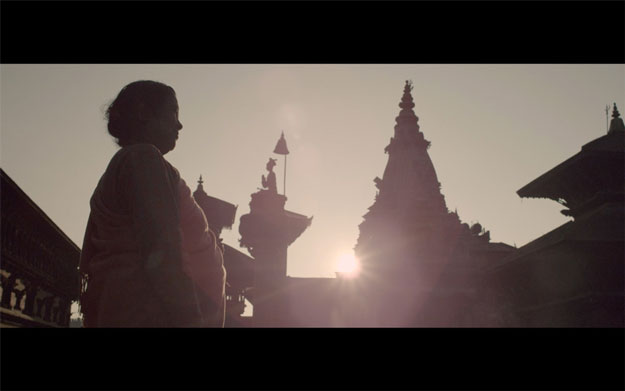
Well, we definitely weren’t interested in making blockbusters! From its conception, we didn’t have a script for ‘Unwritten’ and weren’t sure which direction it would go. We wanted to shoot something that was visually beautiful and a sort of art piece that could go on a festival lineup. We wanted to create a film which could encourage people to journal and to travel and to think outside of themselves. There really wasn’t much shaping or thought around what’s going to work or win awards. I think the strength of the film lies in its honesty and the fact that it’s visually strong.
I’ve always been fascinated by countries which haven’t been colonised. It’s been said to me before that Nepal is a ‘museum without walls’. It’s such a spiritual place where a lot of religions and spiritual practices come together. When you watch the film, you can see that even the way that I was writing was very optimistic; we’re going to a place with old world wisdom that can teach me things! And then, as it went on, we developed a better (or more grounded) understanding - not only of the Kathmandu valley and Nepal, but also of myself and what we were trying to achieve. It became more and more real as it progressed.
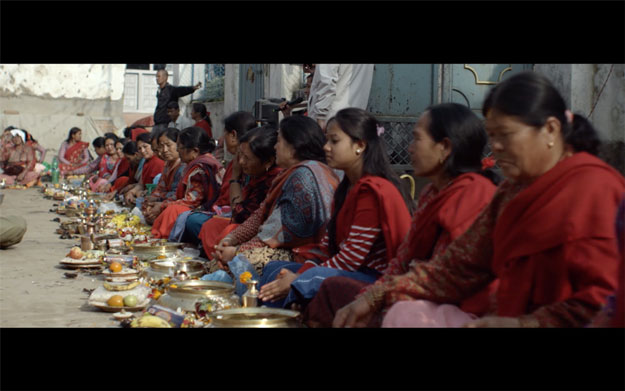
Very often in the media/advertising world, there are a few key speakers or thought leaders around the place, but it’s always the same people who think in the same way; even on a global level. I found it very repetitive, very sterile, very cold. So how do we get out of this comfortable boardroom environment? That was the core of what we set out to achieve. We’re not career narrative filmmakers. We (The Fort) are a creative agency and a production company that specialises in visual storytelling for brands. We realised that we needed to be inspired by things outside of the boardroom in order for us to stay fresh. We talk about thinking differently, but sometimes you have to actually do it!

We found a fixer in Kathmandu and when we first got there, they had organised a lunch at the old prime minister’s home. We didn’t even bring our cameras. They asked us why and we said, “We really just want to chat to ordinary people” and it was very hard for the first two or three days, because we kept being introduced to the owner of the art council and this or that and we had to push back at it all the time. A lot of the people that we spoke to happened very organically through the crew. “Hey, let’s sneak off down this side road and try to chat to someone who knows an artist there. Let’s spend the whole day driving up to the monastery in the hope that someone will speak to us.” Nothing was guaranteed.
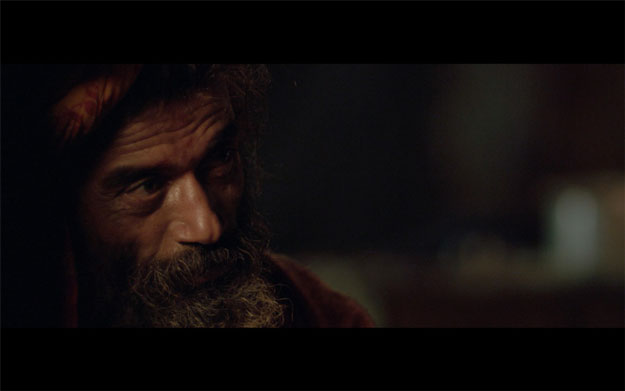
There were four of us from South Africa (including me and Amr Singh the director) and then probably four or five people from Nepal. We had a fixer, a translator and someone to help him carry things, a guy who used to burn DVDs and was now our sound guy. I think the crew was a really cool aspect of the trip which we didn’t capture in the film, but will include in the Behind-the-Scenes when it gets released.
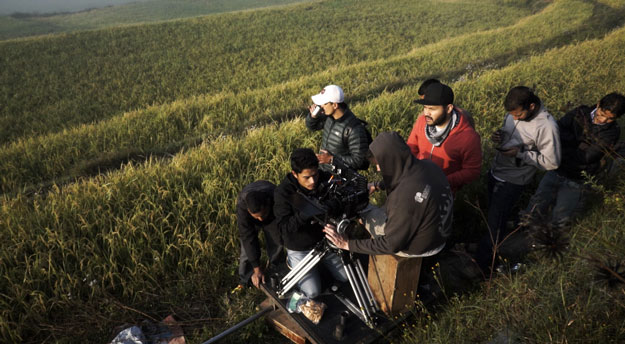
We immediately reached out to everybody; we’re friends with almost all of them on Facebook actually. Thankfully none of them were affected by the earthquake and many of them have been helping with the relief efforts. The Nepali people are very resilient people. In one sense, it must be so painful that some of the buildings in the early shots of the film are gone forever (Durbar Square for instance). You can see how painful it is when you chat to them, their culture and heritage has endured so deeply. But on the other hand, they are people who move on through their spirituality by telling stories; I almost feel like there’s a strength around that which enables them to deal with it better than others.
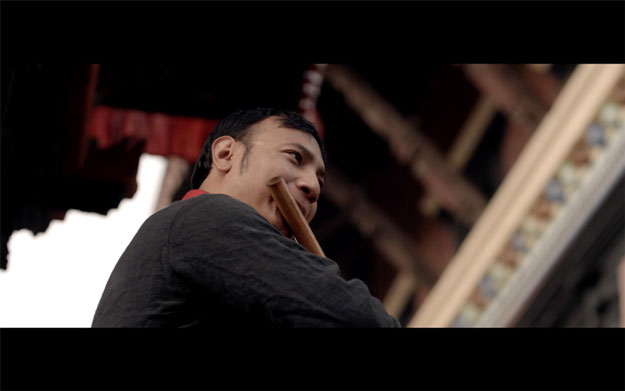
The Rainmaker’s Journal is basically a platform which encourages people to journal and to share knowledge. How do you share knowledge with people who are not often heard or published? I think if we want a pluralistic view on where we get our information from; that’s where Rainmakers Journal comes from. My hope is that ‘Unwritten’ the movie will be a tool to encourage people and show them the strength of the journal.
The voice-overs in the film are from my actual journal- there might have been a tweak here and there, but for the most part it is all from my journal. Amr brought the visuals to life very strongly in the sense that the writing sets up the imagery of the scenes quite powerfully. In many ways I think ‘Unwritten’ is a visual poem of what we went through in Nepal.
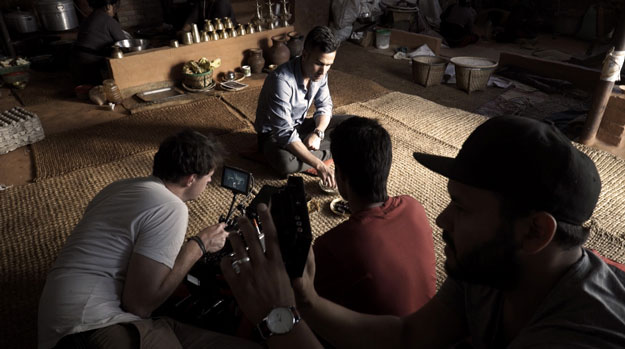
He mentions in the film that some people crush paint with him for a year or more before they are ‘taught’ anything. Almost everyone I spoke to emphasised that you learn by doing and being part of something; being an apprentice. You can’t just sit down and get these answers in one sitting.
In all honesty, that scene captures a very hard, self-reflexive moment, where it felt like a very foolish endeavour; coming to Nepal on spiritual tourism and trying to get knowledge from other people in a takeaway, single-sitting sort of way. It’s very real and that’s what I wrote down on that penultimate night. I was walking the street and just watching people laughing and having a cup of tea and thinking “What did we achieve here?” At that point I didn’t realise how the film would come together. And then the guys said “You know what, its dark. Let’s try and go to Pashupatinath. Let’s do one more interview”.
Unwritten: A Visual Journey of Nepal Trailer from The Fort on Vimeo.
There’s no way I could explain the feeling in the air, the whole crew were just silent. We were just immersed in a completely different type of energy. We were in a place where people commit themselves to total enlightenment, speaking to someone with no earthly attachments whatsoever. When he spoke, he made the whole trip fall into place for me; “You’re living a natural path and that’s fine”. There’s no single moment of truth; you need to enjoy the little things in life. It took away a lot of the restlessness which was there even a year and a half ago, two years before we went on the trip. You don’t often get the chance to meet someone like that!
And you don’t have to get on a plane and go to a far-off land. I think that the film almost does that for you, because it’s so vivid and so real. Whatever you’re searching for in your life, whatever you’re trying to make sense of when you wake up in the morning and get dressed and get into your car. It speaks to that conflict that we all have about “What does it all mean?!”I think that’s the universal story.
Unwritten is due for release on 8 December at Sterkinekor’s head offices in Sandton. More information can be found here.
